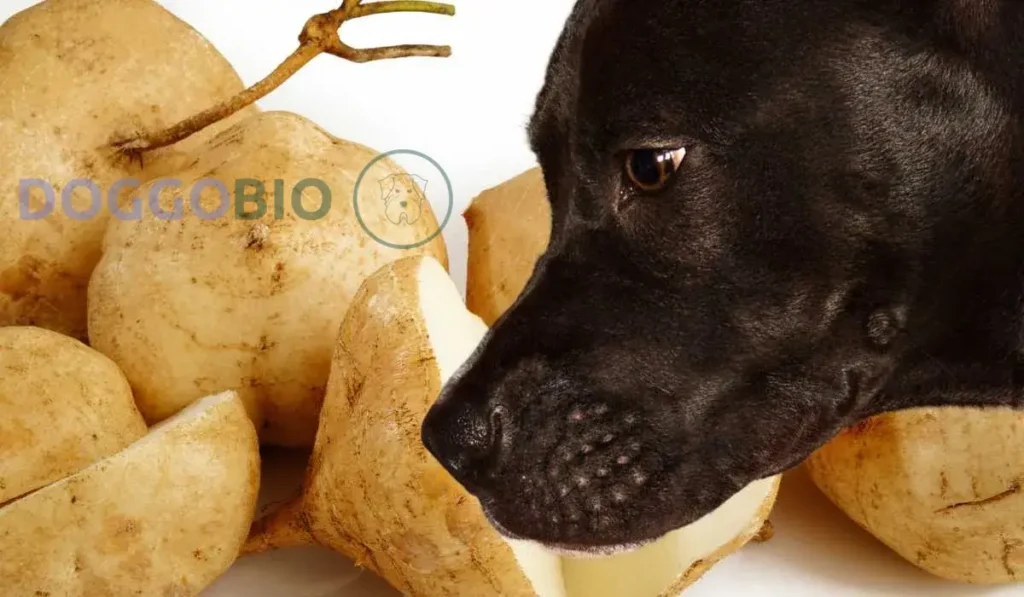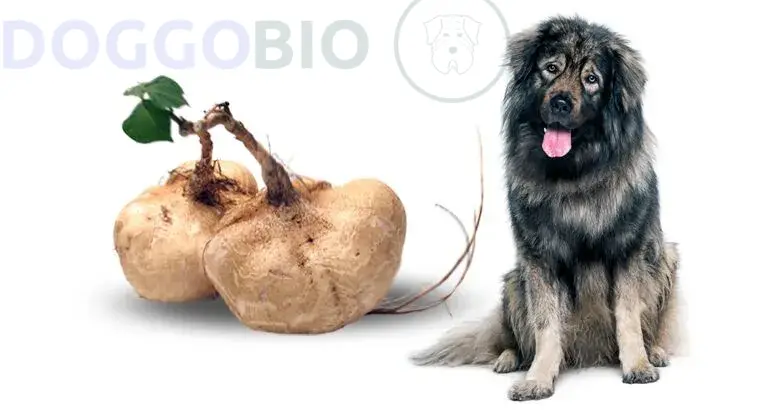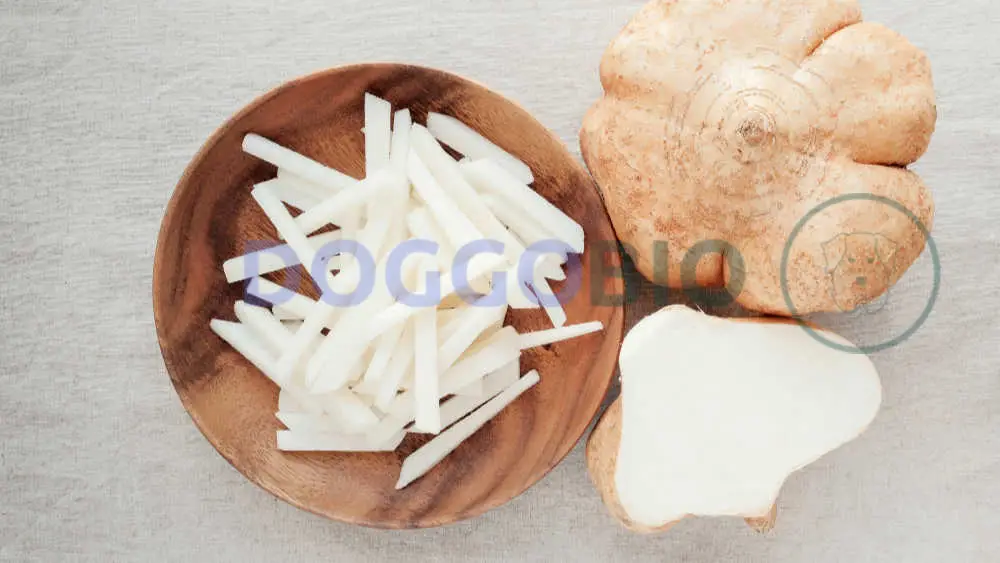As pet owners, we often ponder the safety of various foods for our furry friends. One food that might spark curiosity is Jicama, a crunchy, sweet root vegetable gaining popularity in human diets. But the common question arises: Can dogs eat Jicama? The short answer is yes, dogs can eat Jicama. However, as with any human food introduced to a dog’s diet, there are essential considerations to remember.
This article delves into the world of Jicama as a potential snack for your canine companion. We’ll explore the nutritional benefits, potential risks, and how to introduce this vegetable into your dog’s diet. Whether you’re a seasoned dog owner or new to pet care, understanding what your dog can and cannot eat is crucial for their health and well-being. So, let’s uncover the truth about dogs and Jicama.
Can Dogs Eat Jicama?
The short answer is yes, dogs can eat Jicama. This root vegetable is not toxic to dogs and can even provide health benefits.
However, as with any new food, it is important to introduce it slowly and in moderation to avoid any potential digestive issues. Additionally, it is always best to consult your veterinarian before adding new food to your dog’s diet.
Health Benefits of Jicama for Dogs
Jicama is a low-calorie and nutrient-dense vegetable that can provide some health benefits for dogs. Here are some of the potential benefits of feeding Jicama to your furry friend:

- Rich in Fiber: Jicama is an excellent fiber source for maintaining a healthy dog digestive system. A high-fiber diet can help regulate bowel movements and prevent constipation.
- Low in Calories: If your dog needs to lose or maintain a healthy weight, Jicama can be a great addition to their diet. It is common in calories but still provides a satisfying crunch, making it a great alternative to high-calorie treats.
- Good Source of Vitamins and Minerals: Jicama contains vitamins C and E, as well as minerals like potassium, magnesium, and iron. These nutrients are essential for maintaining your dog’s overall health and can help boost their immune system.
- Promotes Healthy Teeth: The crunchy texture of Jicama can help remove plaque and tartar from your dog’s teeth, promoting good oral health. However, it should not be used as a substitute for regular brushing and dental care.
- Helps with Hydration: Jicama has a high water content, which can help keep your dog hydrated. This is especially beneficial during hot summer months or if your dog is prone to dehydration.
How to Feed Jicama to Your Dog?
Now that you know the potential benefits of feeding Jicama to your dog, let’s discuss how to do it safely. Here are some tips for incorporating Jicama into your dog’s diet:

1. Introduce It Slowly
As with any new food, it is essential to introduce Jicama slowly and in small amounts. This will allow your dog’s digestive system to adjust to the fresh food and minimize the risk of stomach upset.
2. Peel and Cut Into Bite-Sized Pieces
Before feeding Jicama to your dog, peel off the tough outer skin and cut it into bite-sized pieces. This will make it easier for your dog to chew and digest.
3. Cooked vs. Raw Jicama
While both cooked and raw Jicama are safe for dogs to eat, cooked Jicama may be easier for them to digest. If your dog has a sensitive stomach, it may be best to cook the Jicama before feeding it to them.
4. Avoid Seasonings and Additives
When feeding Jicama to your dog, avoid adding any seasonings or additives. These can harm your dog’s health and cause digestive issues.
5. Moderation is Key
Jicama should only be given to dogs in moderation. Too much of this vegetable can cause digestive upset, including diarrhea and bloating. Generally, Jicama should make up at most 10% of your dog’s daily diet.
Can Dogs Eat Jicama Leaves?

No. While Jicama is safe for dogs, the plant leaves are not recommended for canine consumption. They contain a compound called rotenone, which can be toxic to dogs if consumed in large quantities.
If your dog accidentally ingests jicama leaves, monitor them closely for any signs of illness and contact your veterinarian immediately.
Some Posts You Wanna Read More
- Can Dogs Eat Potato Salad?
- Can Dogs Eat Cabbage?
- Can Dogs Eat Cilantro?
- Can Dogs Eat Coleslaw?
- Can Dogs Eat Egg Salad?
- Can Dogs Eat Horseradish?
- Can Dogs Eat Lima Beans?
- Can Dogs Eat Mushrooms?
- Can Dogs Eat Okra?
Frequently Asked Questions
Can puppies eat Jicama?
Yes, puppies can eat Jicama in moderation. However, it is essential to consult with your veterinarian before introducing new food to your puppy’s diet.
Can dogs with diabetes eat Jicama?
Yes, Jicama is low in sugar and can be a good option for diabetic dogs. However, as with any new food, you must consult your veterinarian first.
Can Jicama cause allergies in dogs?
While rare, some dogs may have an allergic reaction to Jicama. If you notice any signs of an allergic reaction, such as itching, swelling, or difficulty breathing, stop feeding Jicama to your dog and consult your veterinarian.
Can Jicama be given as a treat?
Yes, Jicama can be given as a healthy treat for dogs. Just follow the abovementioned guidelines, such as introducing it slowly and in moderation.
Can dogs eat jicama chips?
No, jicama chips are often seasoned with salt and other additives that can harm dogs. Stick to plain, unseasoned Jicama when feeding it to your furry friend.
Conclusion
In conclusion, “Can Dogs Eat Jicama?” can be answered with a cautious yes. Jicama can be a healthy and enjoyable dog treat when given in moderation and prepared correctly. Its nutritional benefits, including vitamin C, dietary fiber, and low-calorie content, make it a potentially beneficial addition to a dog’s diet. However, it’s essential to remember that Jicama should only be served raw and peeled, as the skin and leaves are toxic to dogs.
As with introducing new food to your pet, starting with small amounts to monitor how your dog reacts is advisable. Always consult your veterinarian before making significant changes to your dog’s diet, especially if your pet has pre-existing health conditions or dietary restrictions.

Pingback: Can Dogs Eat Cilantro? Discover the Nourishing Delight! 2024
Pingback: Can Dogs Eat Horseradish? Unveiling the Toxic Truth! 2024